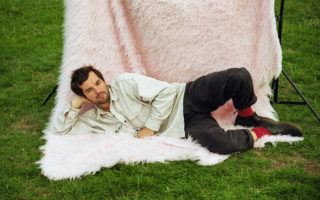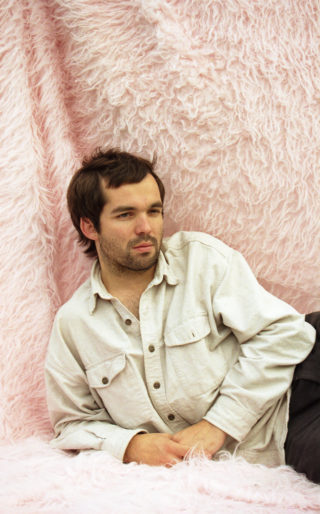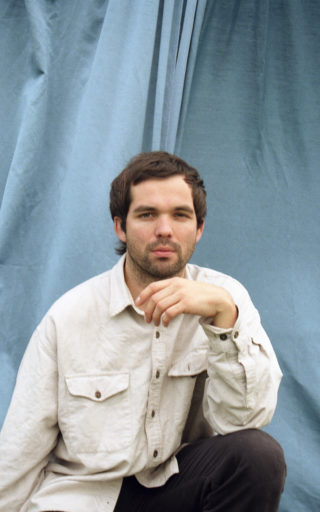The Golden Dregs – Benjamin Woods and Vogues are unlocking new worlds together
Finding optimism in everyday life, even within a pandemic

Finding optimism in everyday life, even within a pandemic
‘Happiness. It come’s on unexpectedly,’ writes Raymond Carver in his aptly titled poem Happiness; a line I’m reminded of time after time in my discussion with Benjamin Woods, the driving force behind The Golden Dregs. Not just because Carver is a huge inspiration to Benjamin, although he clearly is. “I like short stories and poems, particularly Carver,” says Benjamin with a wide smile over the internet. “I don’t have the attention span for reading full novels,” he laughs. There’s another reason Carver is conjured up in our conversation: because Happiness is about appreciating the simple things in life, something that Benjamin, along with the entire world, has been trying to do more of in 2020.
It could have been so different. The Golden Dregs were about to embark on a year of touring off the back of their remarkable 2019 record Hope is for the Hopeless, an observational storybook of songs Carver would have been proud to pen. But you know what happened and everything changed. “In all honesty, I feel like we will be better off for it,” says Benjamin, brightly. “I was able to reset and I think now we will benefit from having time to practice and get tighter. Looking for a silver lining, everything can be a bit more deliberate for us now and we can get back to basics.”
Deliberation was key to Benjamin’s time indoors this summer, as he focussed on finishing a project not many artists are brave enough to take on: reshaping his just-released album to give it a fresh voice. “We had started rolling with it before lockdown happened,” he says, “and that pushed us to finish it, reimagining the album, appreciating the directions these songs could go in and pushing them to extremes a little bit more.” The finished project is an EP called Sorry for Your Loss – a collaboration between The Golden Dregs and London based artist Vogues. It’s a record that warps the warm Americana of Hope is for the Hopeless into something sleazier (‘Hope is for the Hopeless’), more akin to Lynchian noir pop (‘Nancy and Lee’), danceable (‘Just Another Rock’) and endlessly strange (the closing dirge of ‘Clarksdale’).
Benjamin unlocked these sounds by substituting his own baritone vocals for those of guest singers like Anna B Savage, Issie Armstrong and Michael Clark, who helped transform ‘Back Down the Mountain’ into the early chillwave of Small Black. For his part, Vogues provided electronic beds and impulsive grooves to transform the feel of Benjamin’s short stories. “It’s been so nice to welcome in different vocalists,” says Benjamin, “which have opened up these personal songs to different audiences, but it’s also messed with my ego a little bit!” A grin creeps across his face. “You know, everyone prefers Issie Armstrong’s version of ‘Nancy and Lee’ to mine now.”


Benjamin’s found his happy place but he’s certainly fidgeted around to get there. The Golden Dregs has manifested under many guises, through piano-man, bar-band and karaoke-crooner to its current iteration as an all-singing, all-dancing seven piece. Don’t forget this new remixed beat-heavy collaboration as well. “They’re quite drastically different aren’t they. The first record was done in two days in a studio with an old live band in Falmouth. Then for Hope is for The Hopeless I kind of approached it as a solo record and did everything myself and had no intention of releasing it as I thought it was a bit too personal a record.”
The one consistency has been Benjamin’s love of storytelling, although he’s not always been comfortable in that role. “I was a drummer for years and years and found it very difficult to acknowledge that I was writing songs – I would always shy away from that. A change of scenery, moving to London and getting things rolling with The Golden Dregs made me feel comfortable in my own skin and calling myself a songwriter, but now, after Hope is for the Hopeless, I feel that album has guided this project even more and I am way more comfortable working in that style.”
Throughout all of ‘The Golden Dregs’ different forms, it’s been Benjamin’s lyrical turn of phrase that’s cut through. Like other gravel-voiced crooners that have come before him (Bill Callahan and Leonard Cohen two prime examples) he has a way with words. “I really like story-telling,” he says. “It’s something that I admire and respect, and it directly influences my music making process more so than listening to music. It is lovely if someone can say that they can detect an influence of Raymond Carver. ‘Wow, you have really listened to that, it means a lot to me!’ The last record was a break-up album basically – it was experiences surrounding that and my own actions afterwards. I found it quite easy to be frank and write about that because I was emotionally exhausted, which is a good place to be for writing. I felt very insecure about being another guy doing a heartfelt break up album, it’s a bit gross I think, so unnecessary!”
He might find it gross but that feeling of loss ignited a creative spark in Benjamin. Inspiration never seems to be far away, but in 2020 it’s manifested in different ways. “I have written loads of music in the last year, I guess, mostly in the lockdown… I haven’t written much of the lyrics, I have been doing the music first, which is quite new to me. I have felt uninspired lately with lyrics because I have been indoors like everyone else. I just lost my job so now is a good time to get on with it. I was working at the Tate, so I was one of the redundancies there. It’s alright as it’s happening a lot, but it was a really great job with some fantastic people around me. I am now at the mercy of universal credit so we will see how that goes.”
There is a light at the end of the tunnel for Benjamin. He’s out on tour again with the new seven-piece band, a successful streaming show for End of the Road festival a real delight for those who caught it, although it wasn’t without its own drama. “We had a virus scare amongst the band where myself and Issie were isolating waiting for test results and there was a big delay. We couldn’t practice and we thought we might have to pull out. In the end it was all good but it scared me about starting to take bookings on social distancing shows. How careful you have to be not to jeopardise that performance, it’s such a weird way to live but we carry on.”
So is hope really for the hopeless, or, like Carver said, does happiness come on unexpectedly? Benjamin seems to be opting for Carver’s mindset, finding optimism in everyday life even within a pandemic. “I am genuinely very excited,” he says. “I make the mistake of dipping into the news or reading Twitter and it’s people telling stories about all the doom in the music industry with the virus, but you have to be hopeful with things. It’s going to take a bit of time but then it’s going to be fine. You’ll see. Trust me… until the next problem.”